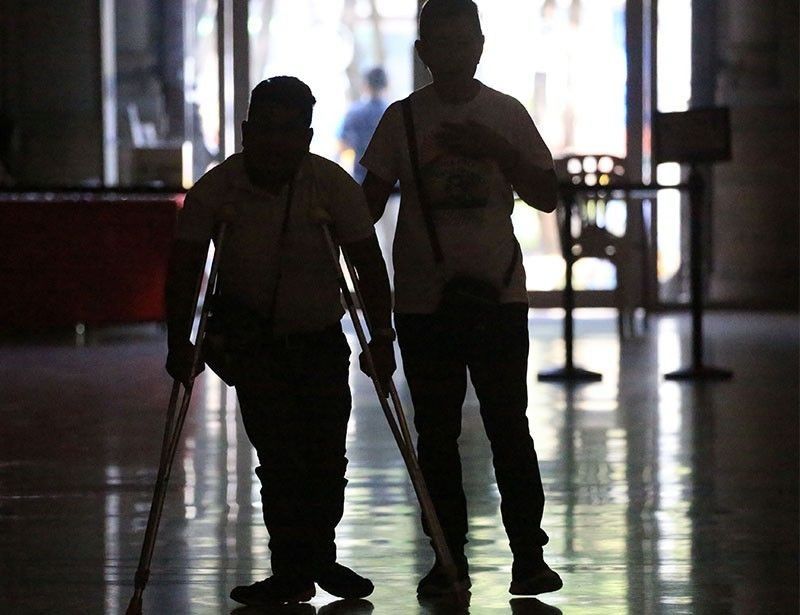Lapid bill seeks monthly social pension for PWDs

MANILA, Philippines — Amid reports of lapses and discrimination in the rolling out of social amelioration funds for the disability community, a lawmaker is hoping to grant persons with disabilities (PWDs) a social pension of their own.
Under the proposed Senate Bill No. 1506, all indigent PWDs verified and certified by the Department of Social Welfare and Development (DSWD) and the National Council on Disability Affairs (NCDA) are entitled to a monthly pension of P2,000.
A "person with disability who is frail, sickly, and without pension or permanent source of income, or regular support from [their] relatives to meet [their] basic needs," is qualified to receive a pension under the bill, while a certified PWD identification card will be required to qualify as a beneficiary under the proposed bill.
Sen. Lito Lapid, who filed the bill, said that the sector should be given priority by the government in its social services program as the country grapples with the COVID-19 pandemic.
“During times of a deep crisis and poverty that the public is experiencing, let’s not forget that our brothers with disabilities have it harder. They need the help of the government and they have the right to receive aid so they can afford to buy what they need,” he said in Filipino in a statement.
An initial amount of P2 billion is proposed to be allocated for the first year of its operation and shall be included in the yearly budget bill.
“It’s already very significant if the government can provide additional financial aid to our PWDs who have no regular income. We’re hoping to use this aid so they can buy their food and medicines on a monthly basis,” the senator said.
“We also want to ensure that Congress will allocate enough funds for it so this program can be implemented and distributed efficiently once it is passed into law,” he added.
No data on disability
The DSWD's social amelioration program is intended to assist indigents who were left sidelined and without income by the enhanced community quarantine.
Two months into the enhanced community quarantine, many families on the ground, including those of PWDs, have said that they have not yet received aid, with the DSWD placing most of the blame on LGUs themselves.
Under the bill, the DSWD and the National Council on Disability Affairs will be tasked with crafting a regularly-updated database of all indigent PWDs.
Disability advocates have said that complaints are harder to prove and consequently file without proper data on PWDs.
The last known census on the disability community in the country was conducted in 2010.
Sought for comment on reports of PWDs who did not receive social amelioration aid amid the enhanced community quarantine, NCDA acting executive director Mateo Lee, Jr told Philstar.com in Filipino: We'll look at that after the evaluation. Right now, we won't respond to that yet, because we don't have statistics. We'll ask the LGUs for data.
Relatives of PWDs or third-party persons found to be fraudulently enrolling in the program despite not being an indigent; or when the PWD is already capable of supporting themselves as certified by the DSWD will be charged a fine ranging from P25,000 to P50,000 for the first violation.
Subsequent violations carry a fine not less than P50,000 but not exceeding P100,000.
A House resolution had been filed in October 2019 seeking an investigation into reports that fixers have been selling PWD cards.
Lapses in information dissemination
In a phone call, Emer Rojas, president of non-government PWD advocacy group New Vois Association and former sector representative at the National Anti-Poverty Commission (NAPC) said that a bulk of the complaints arose from the lack of information dissemination on the PWDs exempted from the social amelioration program.
As it stands, while PWDs are listed as beneficiaries under the social amelioration program, there are a number of exceptions, including PWDs who are also either government employees, existing pensioners, OFWs, public transportation drivers, private employees on 'no work, no pay' arrangements, Pantawid Pamilyang Pilipino Program (4Ps) beneficiaries, employees on 'work from home' status, business owners, PWDs with relatives having income prior to lockdown, solo parents with business or government employment.
Other government departments have been tasked with providing financial aid for some of the exemptions. The labor department, for example, had a financial aid program for displaced workers while 4Ps beneficiaries got aid through the conditional cash transfer program.
"The distribution, that's what should be changed. That's the problem for big barangays. It should be house to house, but it's not organized, so naturally a lot of people will complain. The database for the barangays should be updated too," he said in Filipino.
"Information may not have been widely circulated or some did not understand that there are disqualifications, but unorganized or unregistered PWDs in the household must be identified and given SAP of financial support," he added.
- Latest
- Trending




























